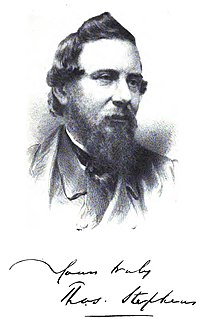
The National Library of Wales, Aberystwyth, is the national legal deposit library of Wales and is one of the Welsh Government sponsored bodies. It is the biggest library in Wales, holding over 6.5 million books and periodicals, and the largest collections of archives, portraits, maps and photographic images in Wales. The Library is also home to the national collection of Welsh manuscripts, the National Screen and Sound Archive of Wales, and the most comprehensive collection of paintings and topographical prints in Wales. As the primary research library and archive in Wales and one of the largest research libraries in the United Kingdom, the National Library is a member of Research Libraries UK (RLUK) and the Consortium of European Research Libraries (CERL).

Edward Williams, better known by his bardic name Iolo Morganwg, was a Welsh antiquarian, poet and collector of ill repute. He was seen as an expert collector of Medieval Welsh literature, but it emerged after his death that he had forged several manuscripts, notably some of the Third Series of Welsh Triads. Even so, he had a lasting impact on Welsh culture, notably in founding the Gorsedd. The philosophy he spread in his forgeries had an impact on early neo-Druidism. His bardic name is Welsh for "Iolo of Glamorgan".

The Black Book of Carmarthen is thought to be the earliest surviving manuscript written solely in Welsh. The book dates from the mid-13th century; its name comes from its association with the Priory of St. John the Evangelist and Teulyddog at Carmarthen, and is referred to as black due to the colour of its binding. It is currently part of the collection of the National Library of Wales, where it is catalogued as NLW Peniarth MS 1.
This article is about the particular significance of the year 1980 to Wales and the Welsh people.

Thomas Stephens was a Welsh historian, literary critic, and social reformer. His works include The Literature of the Kymry (1849,1876), Madoc: An Essay on the Discovery of America by Madoc ap Owen Gwynedd in the Twelfth Century (1858,1893), and Orgraff yr Iaith Gymraeg (1859), as well as a number of prize-winning essays presented at eisteddfodau between 1840 and 1858. He was the first Welsh historian and literary critic to employ rigorous scientific methods, and is considered to have done more to raise the standards of the National Eisteddfod than any other Welshman of his time. Stephens also figured prominently in efforts to implement social, educational and sanitary reforms both locally in Merthyr Tydfil and more broadly throughout Wales.

John Gwenogvryn Evans was a Welsh palaeographic expert and literary translator.

John Jones, better known under his nom de plumeMyrddin Fardd, was a Welsh writer and antiquarian scholar born at Tan-y-Ffordd in the village of Mynytho, Llangian, Caernarfonshire. He was a translator and a collector of folklore.
This article is about the particular significance of the year 1930 to Wales and its people.
This article is about the particular significance of the year 1921 to Wales and its people.
This article is about the particular significance of the year 1905 to Wales and its people.
This article is about the particular significance of the year 1883 to Wales and its people.
This article is about the particular significance of the decade 1850–1859 to Wales and its people.
The Myvyrian Archaiology of Wales is a printed collection of medieval Welsh literature, published in three volumes by the Gwyneddigion Society between 1801 and 1807. Until John Gwenogvryn Evans produced diplomatic editions of the important medieval Welsh manuscripts, the Myvyrian Archaiology provided the source text for many translators of medieval Welsh material. It was founded, and funded, by Owen Jones, who engaged William Owen Pughe as editor, and Edward Williams, better known as Iolo Morganwg, to search Wales for manuscripts.
Evan Evans was a Welsh-language poet, clergyman, antiquary and literary critic.
Robert Joseph Davies, of Cwrtmawr, Llangeitho was a leading figure in the political and religious life of Cardiganshire and in the Calvinistic Methodist denomination. He was the father of John Humphreys Davies.
The General Manuscript Collection of the National Library of Wales includes three series of manuscripts: NLW Manuscript series; NLW ex series of Manuscripts; and, NLW Rolls. All manuscripts acquired by the Library through either donation or purchase are added to this open-ended series, either singly or in groups, if they are: a) in a format compatible with the collection, i.e. manuscript books or rolls, or unbound material that can be filed; and, b) not integral to an archive or individual collection. There is, however, much archival material, mostly correspondence, held in the General Manuscripts Collection. The holdings in the General Manuscript Collection are catalogued in the Handlist of manuscripts in the National Library of Wales, which focuses on those manuscripts in the National Library which are not part of the foundation collections; there were over fifteen thousand when the first volume of the handlist appeared in 1940, and the collection had increased to 23,233 by 31 March 1994.
Margaret Davies or Marged Dafydd was a Welsh poet, scribe and manuscript collector. Her work led to the survival of many printed and handwritten poems in Welsh, which she wrote into her manuscripts. Several of these and the names and identities of their writers have survived only in her copies.

















